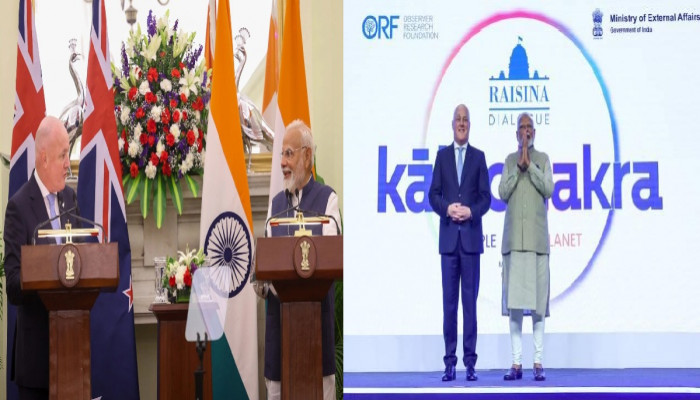PM Luxon’s Visit Revives Stalled India-New Zealand Ties
- In Foreign Policy
- 08:48 AM, Mar 22, 2025
- Ramaharitha Pusarla
New Zealand Prime Minister Christopher Luxon’s picture sitting on the steps of Akshardham, New Delhi is reminiscent of a similar image of former Australian Prime Minister Malcolm Turnbull with PM Modi by his side at the Mandir on his 2017 India visit. Symbolic gestures of leaders during State visits have imbued strategic signalling. The images besides having a greater appeal shed hints for analysts to decipher the directionality of ties in the foreign policy landscape.
Indeed, the similarities don’t end there. Then-PM Turnbull set a deadline for the ratification of the Free Trade Agreement, which was initiated by Tony Abbott in 2014 with India. Addressing the India-New Zealand Business Summit, PM Luxon emphatically stated that “he looks forward to PM Modi signing that (FTA) agreement in 60 days time”.
These uncanny parallels harken back to the road tread by India-Australia partnership. The bilateral ties endured a lull after former Australian Prime Minister Kevin Rudd withdrew from the Malabar Exercises in 2008. Though both nations signed a civil nuclear cooperation agreement in 2014, the ties took a new turn after the revival of Quad 2.0 in 2017. Since then, there has been a marked upswing in India-Australia relations with New Delhi approving the rejoining of Canberra in Malabar exercises. Soon, countries signed the India-Australia Economic Cooperation and Trade Agreement (ECTA) and even agreed on annual summits in 2022. New Zealand appears to be emulating Australia.
New Zealand Prime Minister Christopher Luxon’s five-day India trip symbolises a marked volte-face from the cold response to EAM Jaishankar’s New Zealand trip in October 2022. The rare meeting between the foreign ministers of both countries which lasted for just one hour ended with then foreign minister Nanaia Mahuta’s critical unwillingness to renew Indian students. Alluding to New Zealand’s reluctance, Jaishankar even noted that “there is a larger world out there”. At the press briefing, Mahuta announced that a free trade agreement is “not a priority for New Zealand or India”.
Though New Zealand’s former Foreign Minister Winston Peter travelled to India in February 2020 and launched the “Investing in the Relationship” strategy with a free trade agreement as a major goal, it barely took off due to Covid. The Labour government hardly evinced any interest in engaging with India. As a result, the bilateral ties almost stagnated. With his announcement on FTA, Luxon recommenced talks on FTA, which had been stalled 10 years ago. Accompanied by the largest delegation that has ever accompanied a Prime Minister of New Zealand to any foreign country, PM Luxon arrived in India on March 16. India extended a warm traditional welcome.
India-New Zealand ties established in 1950 though steady, have fluctuated in the past few years. The back-to-back visits of Deputy PM Winston Peters in March 2024 and Indian President Droupadi Murmu’s visit in August 2024 played a critical role in advancing the ties. While India and New Zealand launched FTA talks in 2010, the last formal negotiations were held in 2015. The ambitious record 60 days for FTA spoken in jest was the poll promise of PM Luxon. During his election campaign in 2023, PM Luxon committed to securing an FTA with India by 2026.
Luxon, belonging to the centre-right conservative party with a long corporate career was a former CEO of Air New Zealand. He visited India several times and is particularly keen on engaging with New Delhi given its rising stature as a global player in both economy and geopolitics. Elected in October 2023, he set improving the economy as his top priority.
At the 11th India-New Zealand Joint Trade Council (JTC) held in April 2024, countries identified vast untapped potential. They focussed on establishing a comprehensive economic framework for fostering collaboration in sectors of food processing, horticulture, forestry and pharmaceuticals. India New Zealand Business Council (INZBC) 's June 2024 report called for strengthening ties with India, advancing trade, and enhancing collaboration and dialogues in defence, economic partnerships and people-to-people ties. Besides, as members of the Indo-Pacific Economic Forum (IPEF), both nations continued to engage and cooperate on various aspects of trade.
Besides trade, strategic alignment was at the heart of this diplomatic visit. Both nations are firmly committed to an open, inclusive, stable and prosperous Indo-Pacific, where the rules-based international order is upheld. China’s relentless economic and diplomatic expansion into the Pacific region has been cause of immense concern to New Zealand.
In February, Cook Island signed a comprehensive strategic partnership agreement with China. The Cook Islands is constitutionally obligated to consult New Zealand on security, defence and foreign policy issues. China signed similar agreements with the Solomon Islands and Kiribati. New Zealand’s security intelligence services director Andrew Hampton, has warned of security risks posed by the agreement to the regional architecture raising concerns of foreign interference and espionage.
China’s growing military power projection including PLA’s unannounced live-fire exercises close to the Tasman Sea which forced the airlines to divert flights have sparked concerns in New Zealand about Beijing’s ‘peaceful rise’. China is New Zealand’s largest trade partner, given its proclivity to weaponise trade, New Zealand along with diversification of trade is seeking to improve security ties with India. The new reality and inevitability of tariffs and Trump’s insistence on defence burden sharing besides reshaping the global architecture is forcing nations to restructure their bilateral ties.
Both leaders held restricted and delegation-level talks and agreed to strengthen and institutionalise our defence and security collaboration, encourage investment in dairy, food processing and pharma, and prioritise cooperation in renewable energy and critical minerals. They exchanged views on the Ukraine war extending support for a lasting peace and stressing the importance of a negotiated two-state solution for stability in the Middle East.
Countries signed an Omnibus defence cooperation agreement to evolve a roadmap for bilateral defence industry collaboration, joint exercises, exchange of high-level defence delegation, training and regular port calls by naval ships. Indian Naval Ship Tarini made a port call at Christchurch, New Zealand in December 2024. Coinciding with PM Luxon’s visit, Royal New Zealand Navy Ship HMNZS Te Kaha made a port call in Mumbai. Navies of both nations are working together in Combined Task Force-150 for maritime security in the Indian Ocean.
Countries have also signed MoU on Customs Services, Horticulture, education cooperation, sports and a letter of intent on Forestry. They are exploring the early implementation of digital payments to boost tourism and expedite agreement on mobility and migration of skilled workers. Indian-origin people make up six per cent of New Zealand's population. In a huge fillip to people-to-people connections, Air India and Air New Zealand signed an MoU for direct flights. New Zealand joined India’s Indo-Pacific Oceans Initiative (IPOI) and the Coalition for Disaster Resilient Infrastructure (CDRI).
Khalistan terrorism has been one of the contentious issues of India-New Zealand ties. Expressing concerns about the anti-India activities of these elements, PM Modi expressed confidence that “we will continue to receive the full cooperation of the New Zealand Government against such illegal elements”. PM Luxon acknowledged India’s concerns and affirmed that New Zealand recognises India’s sovereignty and territorial integrity. Echoing domestic sentiments, both leaders visited Rakab Ganj Gurudwara and paid their obeisance.
New Zealand had reservations about India’s Nuclear Suppliers Group (NSG) membership. It has been a major irritant in the bilateral ties. Reflecting on the same, “leaders emphasised the importance of upholding the global nuclear disarmament and non-proliferation regime and acknowledged the value of India joining the Nuclear Suppliers Group in the context of predictability for India’s clean energy goals and its non-proliferation credentials”, in the joint statement.
In sync with New Zealand’s attempts to strengthen bilateral ties, India invited PM Luxon to co-inaugurate New Delhi’s signature defence and security conference, Raisina Dialogue making him the first Oceania leader to covet such honour.
Given the steady rise of India’s global prominence, New Zealand is recognising the need to strengthen ties with India. PM Luxon’s visit has injected a dynamic momentum in the relationship that has immense potential in terms of exploring new opportunities and building on respective strengths.
References
- https://thediplomat.com/2022/10/new-zealands-relationship-with-india-is-in-trouble/
- https://www.india-briefing.com/news/india-new-zealand-bilateral-relations-a-strategic-partnership-34396.html/
- Https://www.mea.gov.in/bilateral-documents.htm?dtl/39197
- https://www.mea.gov.in/Speeches-Statements.htm?dtl/39195/English_Translation_of_Press_Statement_by_Prime_Minister_during_IndiaNew_Zealand_Joint_Press_Statement_March_17_2025
- https://www.mea.gov.in/bilateral-documents.htm?dtl/39196/List_of_Outcomes_Official_Visit_of_Prime_Minister_of_New_Zealand_Rt_Hon_Christopher_Luxon_to_India_March_1620_2025
- https://www.mea.gov.in/media-briefings.htm?dtl/39198/Transcript_of_Special_briefing_by_MEA_on_Official_visit_of_Prime_Minister_of_New_Zealand_to_India_March_17_2025
Disclaimer: The opinions expressed within this article are the personal opinions of the author. MyIndMakers is not responsible for the accuracy, completeness, suitability, or validity of any information on this article. All information is provided on an as-is basis. The information, facts or opinions appearing in the article do not reflect the views of MyindMakers and it does not assume any responsibility or liability for the same.







Comments